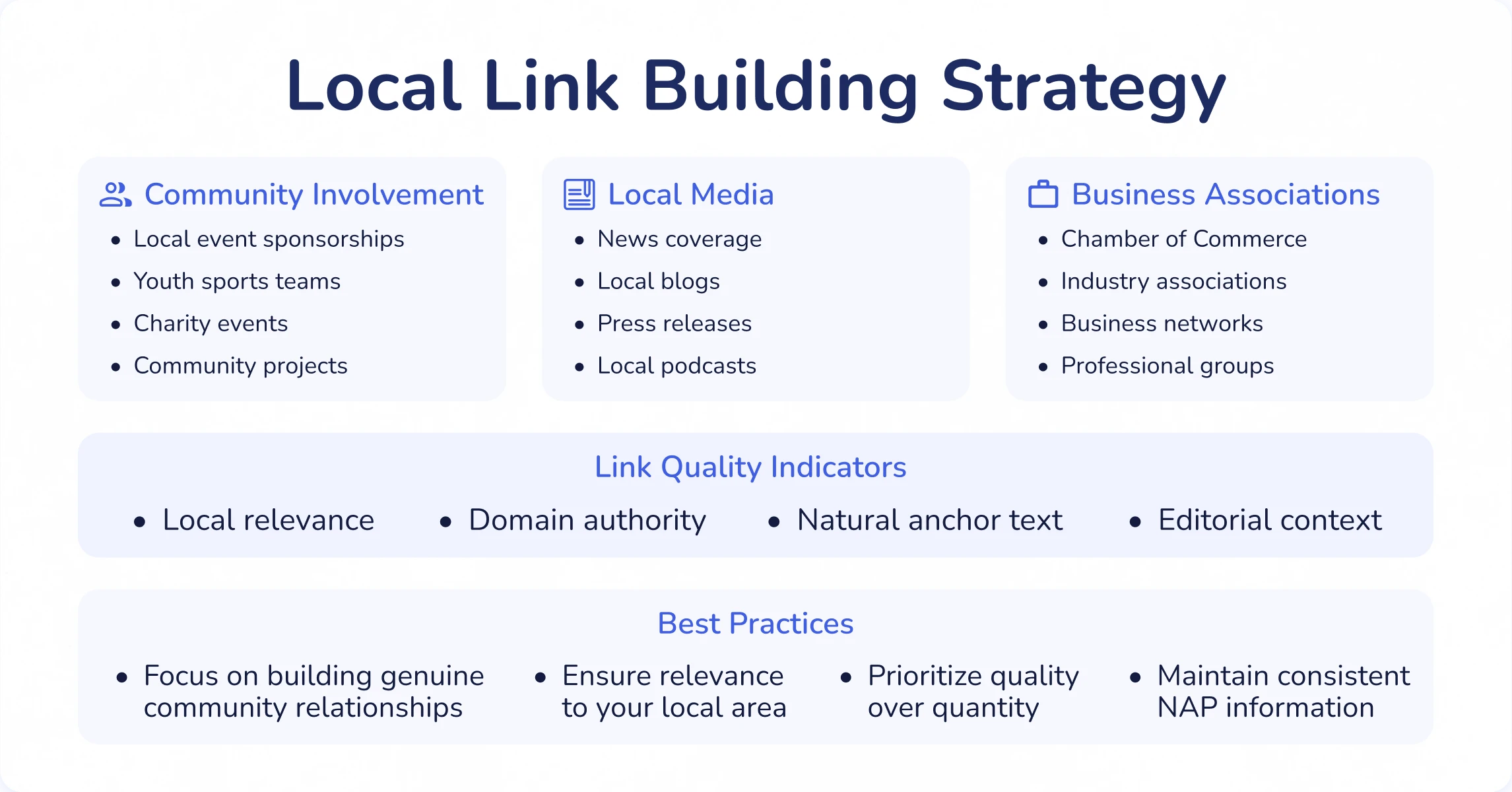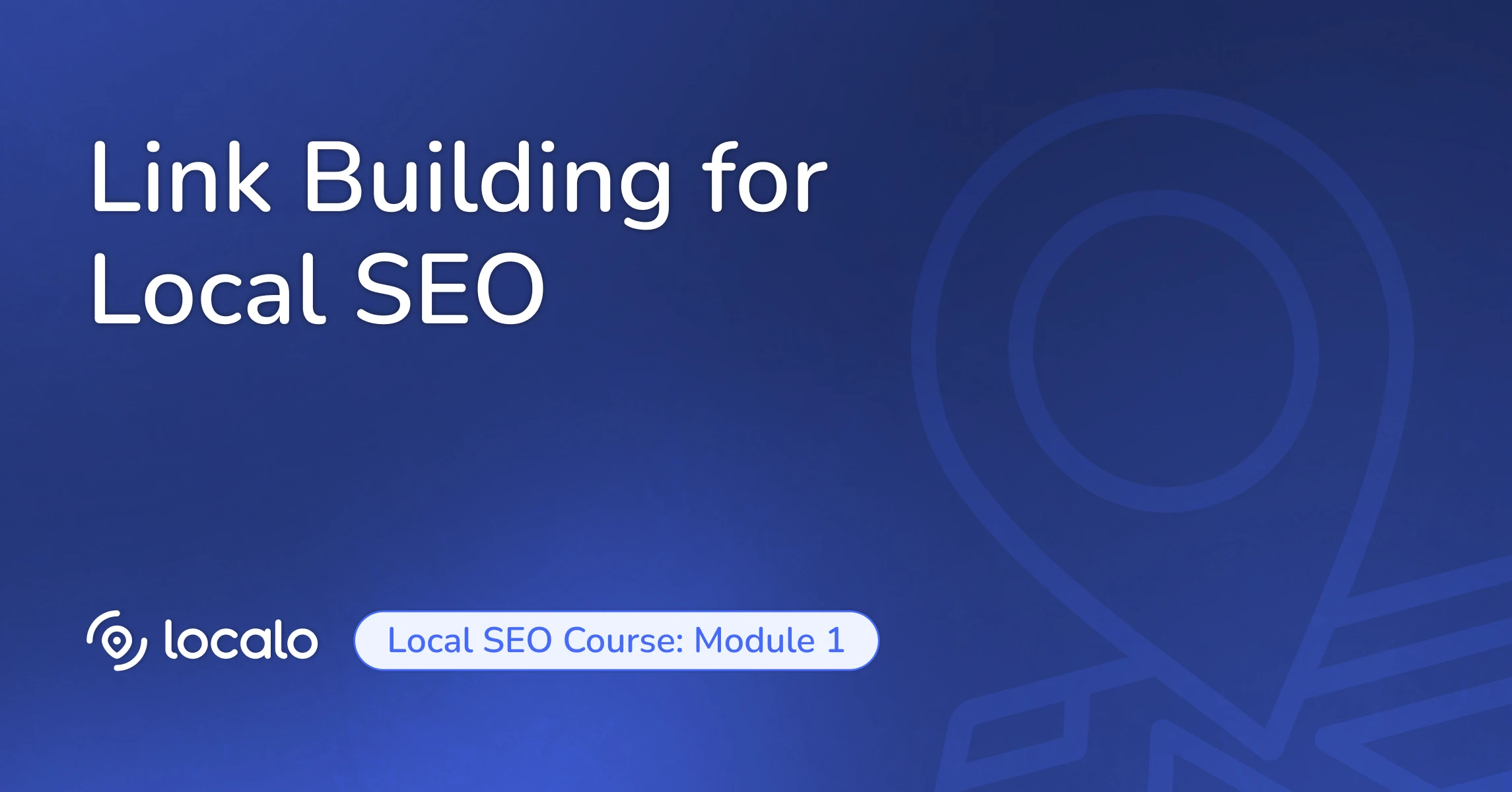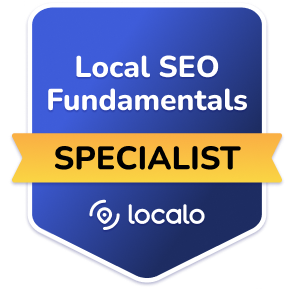Link Signals
Link signals remain one of the foundational elements of local search rankings. According to Whitespark’s Local Search Ranking Factors study, link signals account for 15% of local pack ranking factors. But in the local SEO context, not all links are created equal—the focus should be on gaining links that reinforce your local relevance.
Here’s a real example: imagine you run a pizzeria in Brooklyn. A link from the New York Restaurant Association or a local food blogger’s review would carry more weight for your local rankings than a link from a general food website based in another country. These local links help Google understand your business’s connection to the Brooklyn community.
The most valuable types of local links typically come from:
- Local news coverage and press releases
- Community event sponsorships
- Local business associations and chambers of commerce
- Neighborhood blogs and community websites
- Local vendor and supplier relationships
Think of local links as digital word-of-mouth recommendations. Just as a recommendation from someone in your community carries more weight than one from a stranger, links from locally relevant sources send stronger signals to search engines about your business’s local authority.
Many businesses overlook the opportunity to build links through community involvement. For instance, sponsoring a local Little League team or participating in a neighborhood festival creates genuine community connections and often results in natural, high-quality local links. Such activities create what I call a “virtuous cycle”—good for your community, your local reputation, and your local SEO.
Remember! Local link building isn’t just about SEO. It’s about building authentic relationships in your community that naturally result in online recognition and authority.

Negative Link Signals
When it comes to building links, I always tell my students: there are no real shortcuts. Yet I still see businesses falling for quick-fix solutions like buying hundreds of low-quality links or joining link exchange schemes. Here’s the thing - Google’s pretty good at spotting these artificial link patterns. Instead of trying to game the system, focus on building genuine relationships in your local community. These natural connections not only create valuable links but also help establish your business as a trusted local authority.
Welcome back to Localo’s Complete SEO Course! Today we’re exploring link building specifically for local businesses. While links have always been important for SEO, the approach for local businesses needs to be tailored to reinforce your connection to your specific geographic area. Let’s discover how to build links that boost your local search visibility.
How do link signals impact local rankings?
Link signals remain one of the foundational elements of local search rankings. According to Whitespark’s Local Search Ranking Factors study, link signals account for 15% of local pack ranking factors. This makes links the third most important factor in determining your local visibility.
But in the local SEO context, not all links are created equal—the focus should be on gaining links that reinforce your local relevance.
Why do local links matter more than general links?
Here’s a real example: imagine you run a pizzeria in Brooklyn. A link from the New York Restaurant Association or a local food blogger’s review would carry more weight for your local rankings than a link from a general food website based in another country.
These local links help Google understand your business’s connection to the Brooklyn community. They signal to search engines that your business is an established, recognized part of the local area.
What types of local links are most valuable?
The most valuable types of local links typically come from:
Local news coverage and press releases Community event sponsorships Local business associations and chambers of commerce Neighborhood blogs and community websites Local vendor and supplier relationships
Think of local links as digital word-of-mouth recommendations. Just as a recommendation from someone in your community carries more weight than one from a stranger, links from locally relevant sources send stronger signals to search engines about your business’s local authority.
How can community involvement help with link building?
Many businesses overlook the opportunity to build links through community involvement. For instance, sponsoring a local Little League team or participating in a neighborhood festival creates genuine community connections and often results in natural, high-quality local links.
Such activities create what I call a “virtuous cycle”—good for your community, your local reputation, and your local SEO. When you support local causes or participate in community events, you often receive mentions on event websites, local news coverage, and social media shares from community members.
Remember! Local link building isn’t just about SEO. It’s about building authentic relationships in your community that naturally result in online recognition and authority.
What artificial link patterns should you avoid?
When it comes to building links, I always tell my students: there are no real shortcuts. Yet I still see businesses falling for quick-fix solutions like buying hundreds of low-quality links or joining link exchange schemes.
Here’s the thing - Google’s pretty good at spotting these artificial link patterns. Instead of trying to game the system, focus on building genuine relationships in your local community. These natural connections not only create valuable links but also help establish your business as a trusted local authority.
What’s next in your local SEO journey?
In our next lesson, we’ll explore how local SEO differs from traditional SEO and how to integrate both approaches for maximum impact. Thank you for joining me today, and I’ll see you in the next video!
The websites and Google Business Profiles used throughout the course are for educational purposes only. We're not affiliated with these businesses and don't claim any endorsement from them. All trademarks belong to their owners. Some examples include visual changes (made with browser tools) to help illustrate the SEO concepts we're teaching. These edits are strictly local and illustrative of specific SEO concepts. They don't affect the original websites.




